FACULTY
The Faculty of the Doctoral School Biomaterials and Biointerfaces (BioMatInt) consists of 9 Principal Investigators (PIs) and 5 Associated Faculty Members from seven Departments of BOKU:
- Department of Agrobiotechnology
- Department of Biotechnology
- Department of Chemistry
- Department of Economics and Social Sciences
- Department of Food Science and Technology
- Department of Material Sciences and Process Engineering
- Department of Nanobiotechnology
Principal Investigators
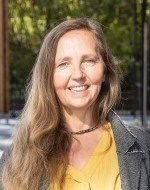
Notburga GIERLINGER is Associate Professor at the Institute of Biophysics at the Department of Natural Sciences and Sustainable Resources. Her research group BIONAMI investigates BIOlogical materials on the NAno- and MIcroscale, with focus on plants. Research projects tackle plant surfaces and interfaces and their hydrophobisation (START-project) or the secrets behind the unique mechanical performance of nutshells in the ERC consolidator grant “Scattering and tapping on soft-hard-open nuts”. The main experimental tools are microspectroscopy (Raman and FT-IR) to reveal chemistry in context with structure and Atomic force microscopy (AFM) to investigate nanostructure, nanochemistry and nanomechanics.
Further information
Georg M. GUEBITZ is Full Professor at the Department of Agricultural Sciences and head of the Institute of Environmental Biotechnology. He also acts as the chairman of the polymer biotechnology section of the European Federation of Biotechnology. He teaches various lectures in the field of biotechnology based approaches for sustainable processes. His research interests are in the development of enzyme based strategies for polymer processing / functionalisation and in environmental biotechnology. He participated in 30 European projects and coordinated 11 out of which. His achievements in the development of environmentally friendly processes using biotechnological approaches resulted in various awards, 15 patents and 340 peer reviewed publications.
Further information
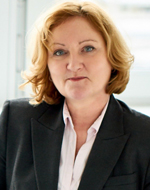
Cornelia KASPER is Professor of Biotechnology and Head of the Institute for Cell and Tissue Culture Technologies. Her research focuses on the development of processes and techniques for the isolation, characterization, expansion and differentiation of human primary/stem cells. For the expansion and differentiation of progenitor/stem cells and co-cultures, we develop optimized dynamic 3 D cell culture conditions mimicking physiological environment for the generation of functional 3 D tissue constructs under defined and controlled dynamic conditions using tailor-made bioreactors and optimized bioprocess parameters. Furthermore, we develop in close collaboration with clinical partners cell based therapy strategies for the manufacturing of cell-based products and cell based 3 D in vitro test systems.
Further information
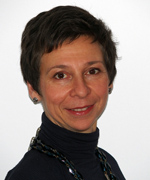
Helga LICHTENEGGER is Professor and Head of Institute at the Institute of Physics and Materials Sciences, Department of Natural Sciences and Sustainable Resources (where she is deputy Head of Department). Her research interests lie in the field of applied physics and biomaterials science, with focus on nanoscale structure characterization and the relationship of nanostructure to macroscopic properties. She has worked on bone, teeth, plant cell walls and proteins in solution, complemented by synthetic materials with bio-inspired structure such as nanocomposites. She applies and further develops x-ray scattering methods in the laboratory and at Synchrotron large scale facilities in Europe.
Further information
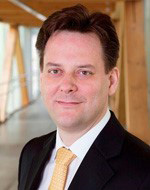
Roland LUDWIG is Assistant Professor at the Department of Biotechnology and Food Science where he started the Biocatalysis and Biosensing Laboratory (BBL) in 2015. His research is enzyme centered and covers fundamental studies on enzymatic mechanisms and enzyme kinetics as well as applied research on enzyme engineering, protein production and bio(electro)catalysis in synthetic and analytic applications. Working with oxidoreductases, the investigation of intra- and intermolecular electron transfer events with fast kinetic and electrochemical methods became the major research interest of BBL. Our goal is to understand the fundamental principles of electron transfer in proteins and apply them in biocatalysis and biosensing.
Further information
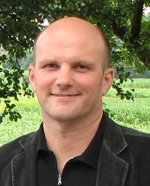
Herwig MAYER is Associate Professor at the Institute of Physics and Materials Science, Department of Natural Sciences and Sustainable Resources. His main field of scientific interest is material fatigue. Research focuses on experimental investigations and predictions of material behaviour after long service times, after stressing with very high numbers of cycles at rather low load amplitudes. Influence of microstructural variability, corrosion, temperature and loading mode on cyclic strength are studied. The ultrasonic fatigue testing method is further developed and used for accelerated testing, i.e. to replicate the actual loading during several years within typically one day.
Further information
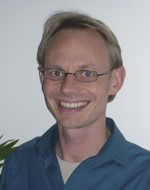
Chris OOSTENBRINK is Professor at the Institute of Molecular Modeling and Simuation and head of the Department of Natural Sciences and Sustainable Resources. Computational approaches to study structure, dynamics and function of complex biomolecular systems are the main focus of his research, in which he tries to strike a balance between method development and applications to molecular systems of interest. Starting from statistical mechanics, he aims to quantify the interactions between molecules or to enhance the conformational sampling. Through computer simulations, the effects of molecular interactions on the structure and function of biological materials is studied.
Further information
Drazen PETROV is a Senior Scientist and head at the Institute of Molecular Modeling and Simulation, focusing on the development and application of molecular modelling techniques, primarily aimed at studying properties of complex systems on the one hand and behaviour of biomolecules on the other. For example, his research interests include examining the effects of complex environments on protein structure, dynamics and function; investigating biogeochemical processes in soil organic matter at the molecular level; and exploring potential limitations of molecular modelling techniques and ways to address them.
Further information

Erik REIMHULT is Full Professor and head at the Institute of Colloid and Biointerface Science. His research spans biointerfaces from biosensor surface functionalization to drug delivery and biologically inspired composites. His current research is focused on the study of colloidal interactions of functional biointerfaces, e.g., for implants, with a special interest in early-stage bacteria adhesion and biofilm formation on solid and liquid interfaces. A major part of his research is the development and application of microscopy and colloidal methods to microbiology and biointerface research.
Further information
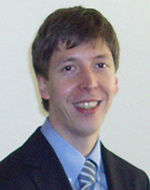
Harald RENNHOFER is Assistant Professor at the Department of Natural Sciences and Sustainable Resources, Institute of Physics and Materials Science. His research interests are structure and properties of bio-based materials (silk, cellulose, lignin, protein) and hierarchically structured materials (carbon fibre reinforced plastics, bone, wood) and is mainly based on small angle and wide angle X-ray scattering in the laboratory and at international research facilities.
Further information
Associated Faculty Members

Anita DE RUITER is a senior scientist at the Institute of Molecular Modeling and Simuation at the Department of Natural Sciences and Sustainable Resources. She has a strong background in computational chemistry and biomolecular simulations, with research focused on free energy calculations, particularly in the context of drug design and protein interactions. She develops methodological innovations to improve the efficiency of binding free energy calculations as well as to overcoming sampling problems.
Further information
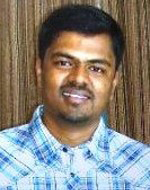
Guruprakash SUBBIAHDOSS is Senior Scientist at the Institute of Colloid and Biointerface Science. Dr. Subbiahdoss holds a Ph.D. in Biomedical Engineering. His main research interest is biofilms at (solid-liquid, air-liquid, and liquid-liquid) interfaces. His research focuses on the development of in vitro methodologies to study bacterial adhesion and early stage biofilm formation at interfaces, host-pathogen interactions, and development of strategies to fight biofilm infections by exploiting new technologies in antimicrobial coatings and nanomaterials.
Further information
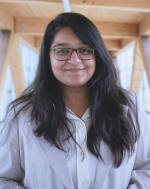
Isita SAGAR is an early-stage post-doctoral researcher at Institute of Cell and Tissue Culture Technologies, Department of Biotechnology and Food Sciences, BOKU. Dr. Sagar is involved in exploring strategies for physiologic and xeno-free, 3D cultivation of human mesenchymal stem cells (hMSCs), production of MSC derived extracellular vesicles, developing in-house assays for determination of immunomodulatory functions of hMSCs, Aligned with the institute's vision and need of the hour, Dr. Sagar aims to develop novel procedures that minimise the use of animal-derived components, and mimics physiological conditions, thereby increasing the clinical relevance of human research.
Further information
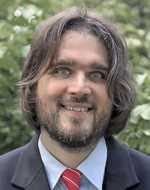
Ronald ZIRBS is Senior scientist at the Institute of Colloid and Biointerface Science, about to submit his habilitation in the area of composite/hybrid structured nanomaterials. Since the start of his diploma thesis at the TU-Vienna Dr. Zirbs has been working on the synthesis, the modification and the analytics of nanoparticles, colloids and complex polymers. Besides his own PhD and postdoc work he co-supervised several diploma and PhD students, is laboratory manager and co-managed the student exercises labs.
Further information
